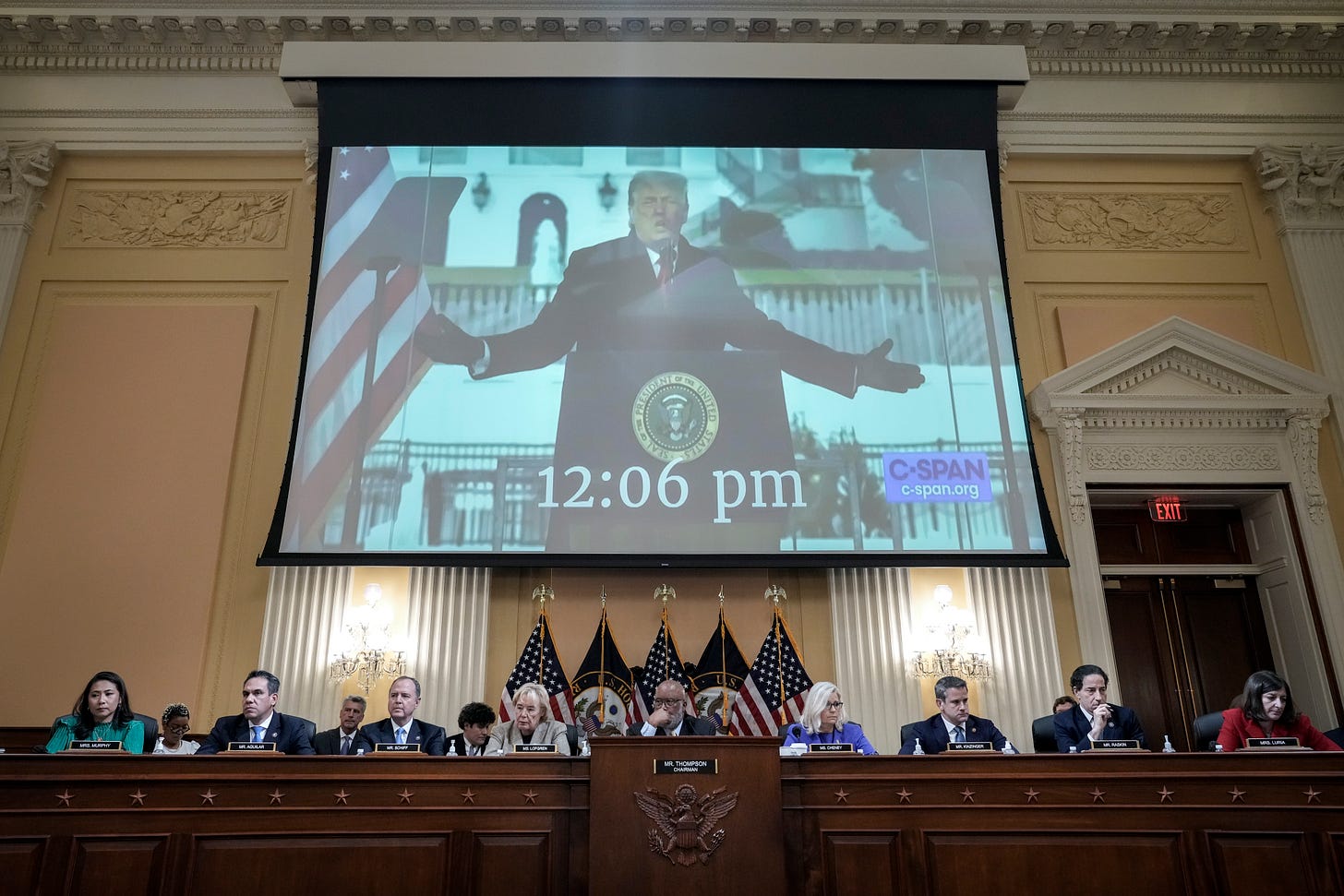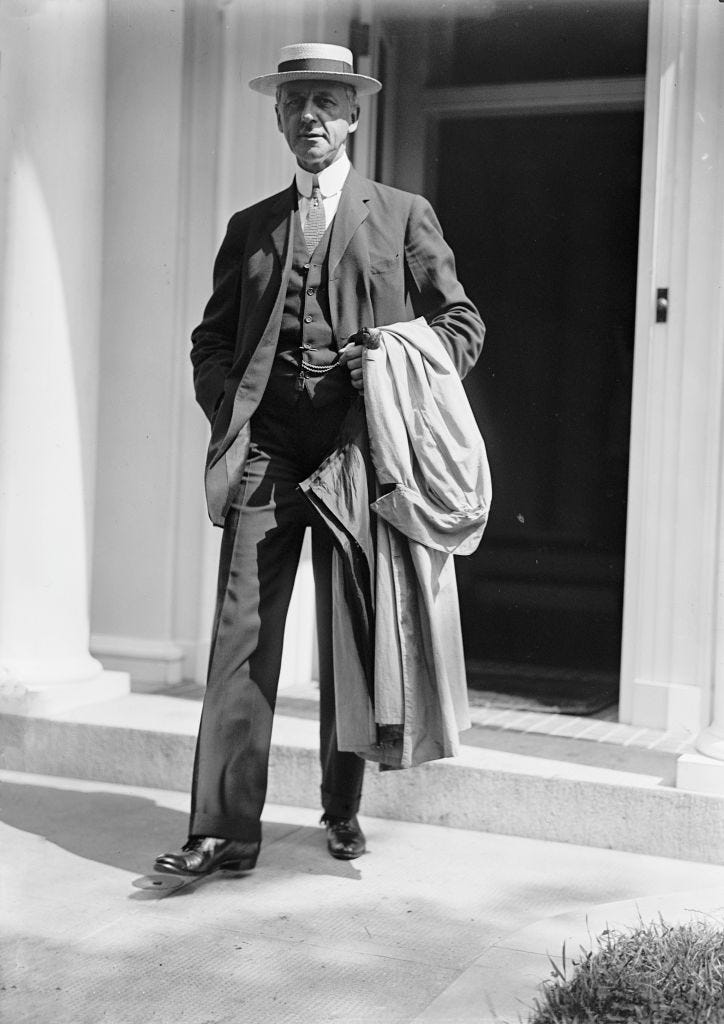You Are Allowed to Have an Opinion About What the Constitution Means
The Supreme Court’s obsession with “history and tradition” gives so-called experts influence they have not earned and do not deserve.
This week, the Supreme Court will hear oral argument in Trump v. Anderson, a case about whether a once-obscure provision of the Fourteenth Amendment allows the state of Colorado to exclude Donald Trump from its 2024 presidential ballot. The Disqualification Clause, adopted in the wake of the Civil War, provides that any “officer of the United States” who previously took an oath to “support” the Constitution, and then “engaged in insurrection or rebellion” against the federal government, is thereafter barred from running to become a part of it. In December, the Colorado Supreme Court concluded that Trump’s actions on January 6, 2021—whipping up a bloodthirsty mob of his supporters who stormed the Capitol trying to overturn a democratic election—make Trump constitutionally ineligible to seek the White House a second time.
Anderson is as doctrinally complicated at it is politically fraught; as Chris Geidner outlines at Law Dork, the case implicates at least six distinct legal questions, many of which courts have never previously tackled, given that armed insurrections fomented by elected officials have been mercifully rare over the past 150 years. The first three questions in Anderson relate to whether Trump checks every box the Disqualification Clause sets out—whether Trump was an “officer of the United States,” and whether January 6 was an “insurrection,” and, if it was, one in which he, personally, “engaged.” The latter three questions relate to the upshot—in other words, if Trump indeed ran afoul of the Disqualification Clause, the extent of Colorado’s authority to take matters into its own hands and boot him off the ballot.
Prevailing on any one of these questions could decide the case in Trump’s favor, which means that even in Supreme Court-adjusted terms, there is a ton of jargon swirling around this Discourse. Thanks to the ascendance of originalism, a jurisprudential philosophy that fetishizes “history and tradition” to the point where honest-to-God federal judges are declaring the government powerless to stop domestic abusers from shooting their partners to death, most of the arguments here are written in the same language: experts poring over the history of the Reconstruction Amendments to explain why Trump should win by a comfortable margin. In The New York Times, for example, the law professor Kurt Lash argues that the Fourteenth Amendment’s drafters would not have thought the Disqualification Clause applied to presidents, because the office of the president was considered to be part of the federal government, not a “civil office” under the federal government. “The Supreme Court should limit the clause to its historically verifiable meaning and scope,” he writes.
As confident as Lash is, he has plenty of company. The “historical background,” one brief argues, demonstrates that in 1788 and 1868, “officers” of the United States were understood to refer to appointed officials, not elected ones. A careful review of “history, case law, and congressional action,” another argues, shows that the Disqualification Clause is not “self-executing,” and that Congress must pass laws to give it effect. A particularly ambitious genre of brief claims that presidents cannot be subject to the Disqualification Clause because the presidential oath of office talks about a duty to “preserve, protect, and defend the Constitution,” but not to “support” it. Another asserts that Trump’s actions on January 6 were not serious enough to constitute “engaging” in insurrection, which is roughly analogous to explaining that, technically, a deadly Capitol riot is only an “insurrection” if it comes from the insurrection region of France.
Trump sympathizers, supporters, and sycophants aren’t the only ones claiming to have all the answers. One oft-cited law review article by a pair of conservative law professors undertakes a purportedly comprehensive historical survey to determine that the Fourteenth Amendment indeed disqualifies Trump, and that the question is “not even close.” Other briefs make the case that the Disqualification Clause is self-executing, or that “presidents” are certainly “officers,” or that “text,” “constitutional structure,” “history,” and “common sense” all imbue the states with the authority to enforce the Clause, no congressional authorization needed. Again, the conclusions are different, but the vocabulary is the same: If only the Supreme Court focuses on the correct snippet of history, it can and will arrive at an objectively correct result.
This is all well and good, because law professors need to do something with their time, and appellate litigators need to write amicus briefs so that they can tout their authorship of amicus briefs on their law firm bios. But as the justices prepare to resolve the most politically consequential case in two decades, I want to remind you that you do not have to have a history Ph.D to have a legitimate opinion here. You do not have to listen to people who insist that you aren’t sophisticated enough, or haven’t read enough books, or haven’t spent sufficient time parsing a dusty, yellowed congressional record to decide whether Donald Trump, in a last-ditch effort to remain in power, “engaged in insurrection or rebellion” against the government he ostensibly led. In a representative democracy, the law means what the people subject to it say it means, regardless of the prevailing stance among academics churning out vanity essays hoping for a cable news hit.
I am not suggesting that historical context is irrelevant, especially when dealing with questions of first impression. I am simply saying that the nerds do not have a monopoly on furnishing answers. There is no objectively correct way to interpret obscure provisions of a 250-year-old document riddled with vagaries, inconsistencies, and clumsy revisions. Even if it were possible to divine what the drafters, shaken by a catastrophic civil war and unsure of their ability to prevent another, would have thought about January 6, those men have been dead for a century now. You and I live in 2024, where political violence encouraged by Donald Trump is on our metaphorical and occasionally literal doorsteps, fueled by rampant disinformation and encouraged by a political party that more closely resembles a death cult with each passing day. You are allowed to participate in a discussion about what your Constitution means—not what it may have meant once upon a time, but what it means today, right now, in the real world, in an election in which an aspiring despot is a coin flip to come out on top.
Like all Supreme Court cases, Trump v. Anderson will mostly treat what happened on January 6 as something of an abstraction—as the factual background giving rise to a complex legal question for the country’s fanciest lawyers to puzzle over. This is not framing you have to accept. You watched with your own eyes as Trump, sensing power slipping from his grasp, stood on the stage and urged his aggrieved supporters to “fight like hell.” You listened with your own ears to tapes of him threatening state officials with criminal prosecution if they didn’t “find” enough votes to win an election he lost in decisive fashion. You saw video footage of Capitol police officers desperately trying to divert rioters from Mitt Romney’s escape route, and of rioters traipsing through the hallways of the Capitol, eager to hang whichever of Vice President Mike Pence or House Speaker Nancy Pelosi they had the good fortune of encountering first. You are allowed to consider all the available evidence and conclude that, if words mean anything, Donald Trump “engaged” in an “insurrection,” and that as far as consequences go, exclusion from the electoral process is actually kind of lenient.
And if this Supreme Court—a Supreme Court controlled by six conservative justices, three of whom owe their life-tenured seats to Trump’s benevolence—twists itself into logical pretzels to breathe new life into Trump’s political career, you are allowed to conclude that that Supreme Court is, in fact, breathtakingly full of shit. The justices are, for better or worse, the formal authority on the law in this country, and they have all the tools they need to protect democracy from a candidate who has never been shy about his desire to grind it into dust. If the justices take the easy way out in Trump v. Anderson, it will be an affirmative, intentional choice. Their hands are tied by nothing but their own cowardice.
As always, you can find everything we publish at ballsandstrikes.org, or follow us on Twitter at @ballsstrikes, or get in touch by emailing contact@ballsandstrikes.org. Thanks for reading.
This Week In Balls & Strikes
Anti-Voting Judges Are Soft-Launching a Repeal of the Fifteenth Amendment, Madiba Dennie
Conservative judges aren’t satisfied with ignoring your voting rights. They also want to prevent YOU from doing anything to protect them.
Idaho AG Very Upset By Criticism Of Right-Wing Lawyers Working For Him For Free, Susan Rinkunas
Raúl Labrador appears to be auditioning for the role of the Sam Alito of state attorneys general.
This Week In Other Stuff We Appreciated
Donald Trump Is Asking the Supreme Court For the Bush v. Gore Treatment, Rick Hasen, Slate
“The surest way for the court to lose more respect in the public’s eye is if it creates a rule that helps Donald Trump and only Donald Trump.”
Durbin Still Can’t Quit Blue Slips, So the Judiciary Will Continue to Suffer, The Daily Kos
“Assuming Biden wins a second term, should Republicans gain control of the Senate in 2024 or thereafter, his ability to get his chosen judges confirmed will almost completely evaporate.”
The Supreme Court Shouldn’t Even Hear Trump’s Appeal on Immunity Ruling, Ray Brescia, The Daily Beast
Trump is trying to run out the clock. The justices have a choice about whether to let him do so.






